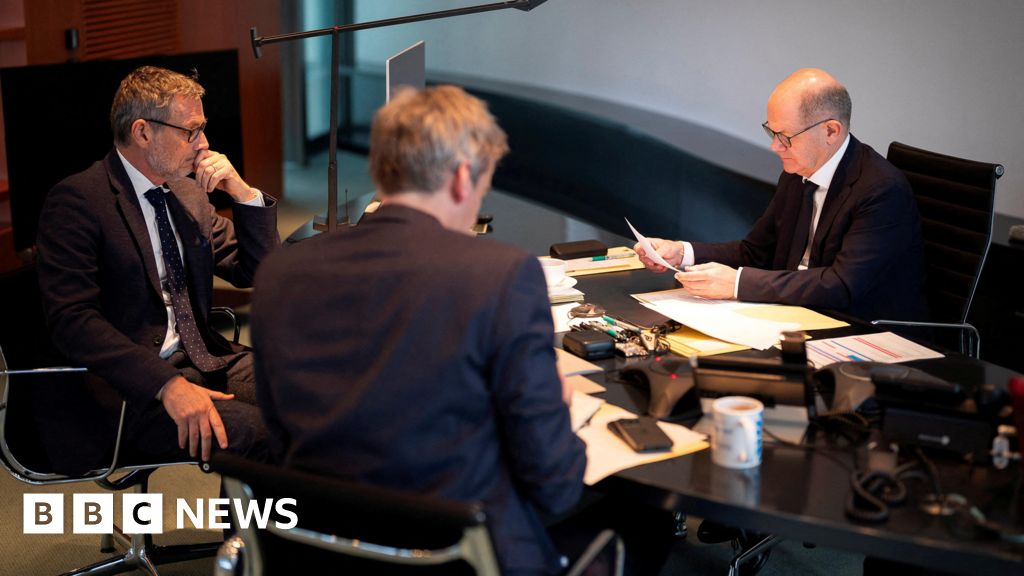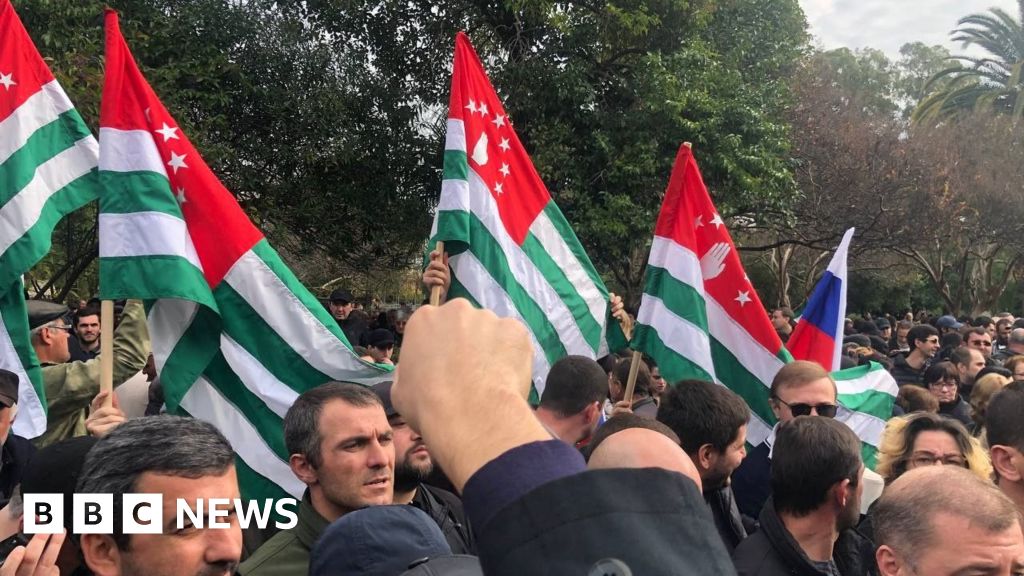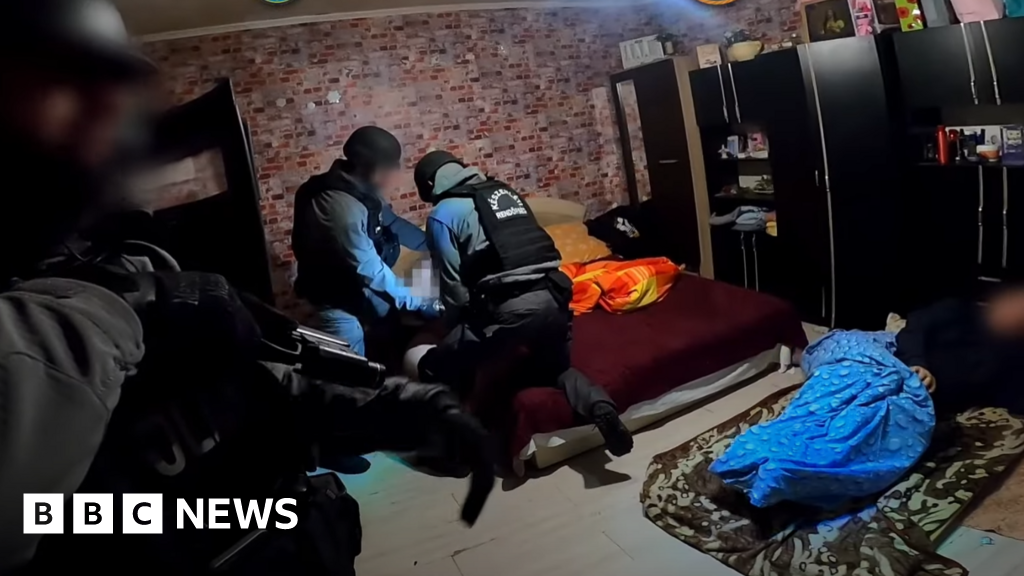ARTICLE AD BOX
By Rayhan Demytrie
BBC News, Tbilisi
Image source, Getty Images
Image caption, Mikheil Saakashvili was credited with radical reforms in Georgia but convicted of abuse of powerSupporters of Georgia's former President Mikheil Saakashvili were finally rewarded with a glimpse of their hero when he appeared last week behind a barred window in Rustavi Prison. "Misha! Misha!' they chanted.
Prison wardens pulled him out of sight, but not before he was pictured smiling and making a heart sign with his hands. Even from behind bars he continues to make headlines.
Saakashvili made a surprise return to Georgia after eight years in exile on the eve of local elections. He was arrested on 1 October, wanted for his conviction in absentia of abuses of power.
'Drifted back into Russia's orbit'
Since then he has been on hunger-strike claiming to be a political prisoner.
"Why did I give up my freedom, and my life as a Ukrainian government official, to become a prisoner of conscience in my homeland?" he wrote on the 17th day of his hunger strike.
Image source, Georgia Interior Ministry/Reuters
Image caption, An interior ministry video showed Saakashvili (centre) in handcuffs after his arrest"I couldn't watch from afar while the country I worked so hard to build, from a failed post-Soviet state to a nascent Western democracy and staunch US ally, drifted back into Russia's orbit."
His lawyers and doctors say his health is deteriorating, while the Georgian Dream government claims this saga is a well-timed piece of political theatre.
Irakli Kobakhidze, chairman of the governing party has called Saakashvili's hunger-strike "a mock chronicle" ahead of Saturday's mayoral run-off elections for control of five of the country's major cities.
Dismissing the former president as just "an ordinary prisoner", he said it was nothing but a show: "I assure you, as soon as the elections are over, Saakashvili will no longer be on the agenda."
Enemy number one
But the former president's lawyers insist the government is making every effort to silence him, including painting over the windows of his cell and making it difficult for him to pass messages to the outside world.
On Wednesday, a member of Saakashvili's legal team was refused entry at Tbilisi International Airport.
"I experienced Georgian hospitality first hand," Ukrainian lawyer Evgen Grushovets complained.
Image source, Getty Images
Image caption, Protesters have held mass demonstrations calling for Mr Saakashvili's releaseThe government is nervous, political scientist Gia Nodia believes: "They think that Mikheil Saakashvili's presence is an important factor in mobilising the opposition and they want to reduce his effect."
Since his departure from Georgia in late 2013 Mikheil Saakashvili has been enemy number 1 for the country's governing Georgian Dream party, and its billionaire founder Bidzina Ivanishvili.
Decade of polarised politics
Although Mr Ivanishvili no longer holds any official position in the government, many Georgians believe he still exerts an influence on the country's politics.
On 1 October, while announcing Saakashvili's arrest on national TV, Prime Minister Irakli Garibashvili appeared to dedicate his capture to his party's founder.
The rivalry between Bidzina Ivanishvili and Mikheil Saakashvili has, after all, dominated Georgian politics for the past decade.
Image source, Reuters
Image caption, Georgian politics has been dominated for years by Bidzina Ivanishvili rivalry with the ex-president"I appeal to Ivanishvili," wrote Saakashvili in a recent letter from his prison cell.
"You darkened my windows and sealed them, you cut my phone line, you are even afraid to take me to hospital, let alone court."
Rise of a pro-Western reformer
Mikheil Saakashvili was just 36-years-old when in 2003 he led the so-called Rose Revolution, against Georgia's old Soviet-era leadership.
He came to power the following year with more than 96% of the vote and moved quickly to carry out reforms - cracking down on organised crime, rebuilding the police force, and cutting red tape for business.
Georgia's economy boomed.
Image source, Getty Images
Image caption, Saakashvili was eventually held responsible for Georgia's defeat in the 2008 war with RussiaBut in 2008, Georgia fought a five-day war with Russia over South Ossetia that ended in humiliating defeat, the loss of territory, and the displacement of tens of thousands of Georgians. As commander in chief, Saakashvili was ultimately held responsible.
His government became increasingly authoritarian, shutting down a critical media channel, violently dispersing protests, extorting money from businesses, and imprisoning thousands of people for minor offences.
The final straw came in a video on the eve of elections in 2012 featuring allegations of prison torture and abuse. Georgians voted decisively against Saakashvili's United National Movement ending its nine years in power.
New life as Ukrainian governor
Ivanishvili's Georgian Dream coalition pledged to try Saakashvili for abuses of power in office. But Saakashvili left Georgia for a new political career in Ukraine, later becoming governor of the southern region of Odessa where he promised to repeat his reform agenda.
And yet he never stopped playing a role in Georgian political life. On opposition TV channels he would criticise Ivanishvili's government and promised to eventually return to his homeland.
"Saakashvili clearly loves power, he has to be at the centre of events," says political analyst Gia Nodia, who believes he cannot afford to be marginalised. "He has made this firm decision to come to Georgia, it's now or never."
Since his arrest, additional charges have been brought against the former president, including illegally crossing Georgia's state border, allegedly stowed on board a Ukrainian truck loaded with dairy products.
The government has ruled out any likelihood of early release, but there's a growing sense of unease about his continued imprisonment.
And he's likely to continue to remain a thorn in the side of the current government, regardless of the outcome of Saturday's mayoral vote.

 3 years ago
20
3 years ago
20








 English (US)
English (US)